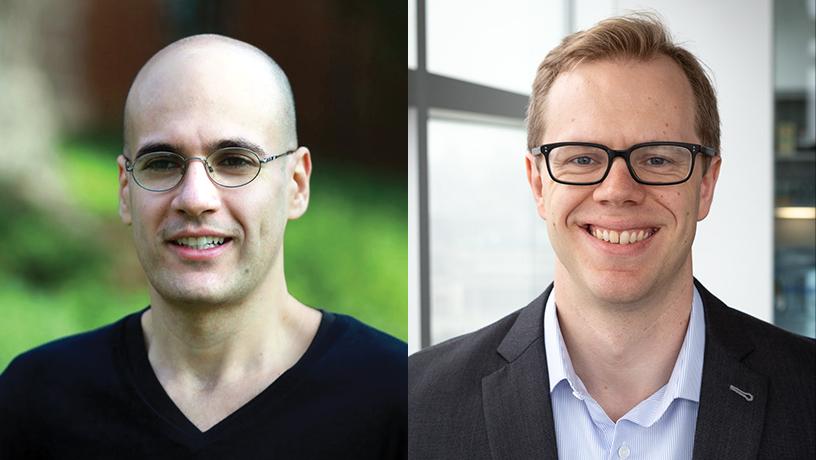Elias Bareinboim and Christian Kroer Win ONR Young Investigator Awards
Bareinboim will develop a new framework that will lead to more efficient and robust decision-making; Kroer will develop new algorithms based on game theory to solve real-world problems with multiple actors

Elias Bareinboim, professor of computer science, and Christian Kroer, professor of industrial engineering and operations research
Elias Bareinboim, professor of computer science, and Christian Kroer, professor of industrial engineering and operations research, have won Young Investigator Awards from the Office of Naval Research (ONR). The ONR-YIP program, which was established in 1985, is one of the nation’s oldest and most selective basic-research, early-career awards in science and technology.
Bareinboim’s project, “Causal reinforcement Learning: Theory, Algorithms, and Applications,” focuses on causal and counterfactual inference and their applications to AI and the data sciences, including the fields of health and social sciences. He will develop a new framework that generalizes traditional reinforcement learning (RL), a form of machine learning where an agent is deployed in the targeted environment and learns through trial-and-error experimentation. Bareinboim expects his new framework to contribute to more efficient, robust, and interpretable decision-making in high-stakes situations. The three-year, $510,000 ONR-funded project will combine traditional RL and causal inference into a new system that Bareinboim calls “causal reinforcement learning.” This will support the development of next-generation robust artificial intelligence systems by allowing agents to use imperfect causal knowledge in uncertain, partially observable environments. Bareinboim discussed these ideas and his initial work in a recent three-plus hour tutorial at the International Conference on Machine Learning, one of the premier machine learning conferences. Bareinboim expects this new framework will transform the RL and AI decision-making field and affect all sectors of society. One application he gives as an example is self-driving cars, where an unbounded amount of experimentation is neither ethical nor feasible, and inductive biases in the form of causal knowledge should be considered.
Kroer’s project, “Fast Iterative Methods for Large Scale Game-Theoretic Problems and Beyond,” aims to develop new theory and algorithms based on game theory for approaching real-world problems with multiple actors, such as protecting critical infrastructure, cybersecurity, and wildlife, and planning naval strategies. Kroer’s research focuses on how AI and optimization methods can enable large-scale economic solution concepts, and he uses game theory to provide a toolbox for how individuals or organizations should act in situations involving multiple actors with potentially different or conflicting goals. His main objective for this three-year, $510,000 ONR-funded project is to design new research that will expand the scale and types of games that are solvable.
“ONR, and the Naval Research Enterprise as a whole, is looking to reimagine naval power,” said Chief of Naval Research Rear Adm. Lorin C. Selby. “To do so, it is critical that we attract the best and brightest scientists and engineers from across academia to tackle warfighting challenges. The Young Investigator Program does just that, and I am excited to announce the recipients for 2022.”
